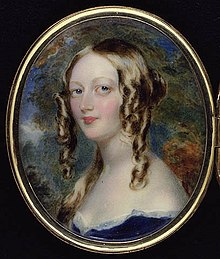Katherine Ellice
Katherine Ellice | |
|---|---|
 by William Charles Ross R.A. | |
| Born | Katherine Jane Balfour 1813 (Probably) Scotland |
| Died | 13 April 1864 |
| Nationality | British |
| Other names | "Janie" Ellice |
| Known for |
|
| Spouse | Edward Ellice |
| Parents |
|
Katherine Jane "Janie" Ellice (née Balfour; 1813 – 13 April 1864) was a British diarist and artist. She is most remembered for her chronicle and watercolours of a trip to Canada, in 1838, where she and her sister were taken prisoner during the Battle of Beauharnois.
Life[edit]
She was born in 1813, the second daughter of eight children of Eglantyne Katherine Fordyce (1789–1851) and Sir Robert Balfour. "She spoke Italian and French, was an accomplished sketcher and watercolourist, and played the piano and guitar." She married Edward Ellice on 15 July 1834.[1]
On 24 April 1838, she boarded HMS Hastings and accompanied her husband, Edward Ellice to Canada in his capacity as private secretary to his cousin (by marriage), John Lambton, 1st Earl of Durham, who was en route to his appointments as Governor-General of the Province of Canada and Lieutenant-Governor of Lower Canada.[1]
Captivity during Battle of Beauharnois[edit]

During the Battle of Beauharnois, she, her husband, and her sister—along with the general household—were taken by surprise during a nighttime siege led by François-Marie-Thomas Chevalier de Lorimier, then held as prisoners. Her husband was held separately. She negotiated with the rebels, and they were allowed to remove to the home of the Catholic priest, then allowed to obtain meat and milk from the Ellices' livestock, to sustain the, eventually, 62 people sequestered together in what she described as the Ellice house "converted into a regular prison".[2]
A brisk firing commenced all around the cottage; bullets coming through the house in all directions. Then came a dreadful rush of Men, women & children, screaming, some falling & being trampled upon in the door way. We thought the rebels were coming to murder us, & locked in Tina's arms I was trying to compose my mind when Mr. Parker pushed thro' the crowd & told us we were safe.
— Jane Ellice, The Diary of Jane Ellice[3]
That day, 10 November 1838, the British won the battle, rebel leaders were taken prisoner, and the loyalist prisoners were freed. Mrs. Ellice had written a diary and made sketches of the "picturesque ruffians". Lord Durham had resigned 9 October 1838, and returned to England, which the Ellice household had been scheduled to do on 9 November, but were then captives. They then returned to England on 26 December 1838.[1]
Artistry[edit]
Katherine Ellice studied drawing with Lord Durham's drawing master, Coke Smyth, who gave lessons to Katherine and Lady Durham in Canada.[4]
Her self-portrait at sea aboard HMS Hastings—the ship the Ellices had arrived to Canada aboard on 27 May 1838—is shown on this page.[5]
Ellice's watercolour depictions of aspects of the 1837 Rebellion, painted while residing in Beauharnois, as well as other works representing Quebec, are included in her art album which is now held at the Library and Archives Canada. A copy of her diary is also housed at the Library and Archives Canada.[citation needed]
Later life[edit]
Her father-in-law, Edward Ellice—who had furnished her with the diary and the task of filling it on her journey abroad—was a frequent host to notable visitors to Scotland, thought highly of "Janie" and so enlisted her, in 1859, as hostess, when the artist Richard Doyle visited; she was given an illustrated diary of a journey to the islands of Rona and Skye.[6]
In 1853, her sister, Eglantyne "Tina", married the cousin of her husband, Robert Ellice (1816–1858), son of General Robert Ellice.
Following her death, in 1864, Edward Ellice remarried.
References[edit]
- ^ a b c K. D. Reynolds, "Ellice, Katherine Jane [Janie] (1813–1864)", Oxford Dictionary of National Biography, Oxford University Press, 2004 accessed 3 April 2018.
- ^ Ellice, J. The doteiary of Jane Ellice; Patricia Godsell, Ed.; Oberon Press; 1975, p. 139. ISBN 0887501648.
- ^ Ellice, Jane (10 November 1838). The diary of Jane Ellice. Oberon Press. ISBN 9780887501647.
- ^ John Richard Coke Smyth (1808-82), Coke-Smyth.com, Retrieved 20 June 2016.
- ^ Patrick Richard Carstens; Timothy L (31 January 2013). The Republic of Canada Almost. Xlibris Corporation. p. 330. ISBN 978-1-4797-4917-1.
- ^ The Log of the Ladye Scan.org, Retrieved 20 June 2017
- 1813 births
- 1864 deaths
- 19th-century Scottish diarists
- 19th-century Scottish painters
- 19th-century Scottish women writers
- 19th-century Scottish women artists
- Clan Balfour
- Lower Canada Rebellion people
- Scottish watercolourists
- British women diarists
- Women in war in Canada
- Victorian women writers
- Victorian writers
- Scottish women watercolourists
- Ellice family
- Scottish expatriates in Canada
